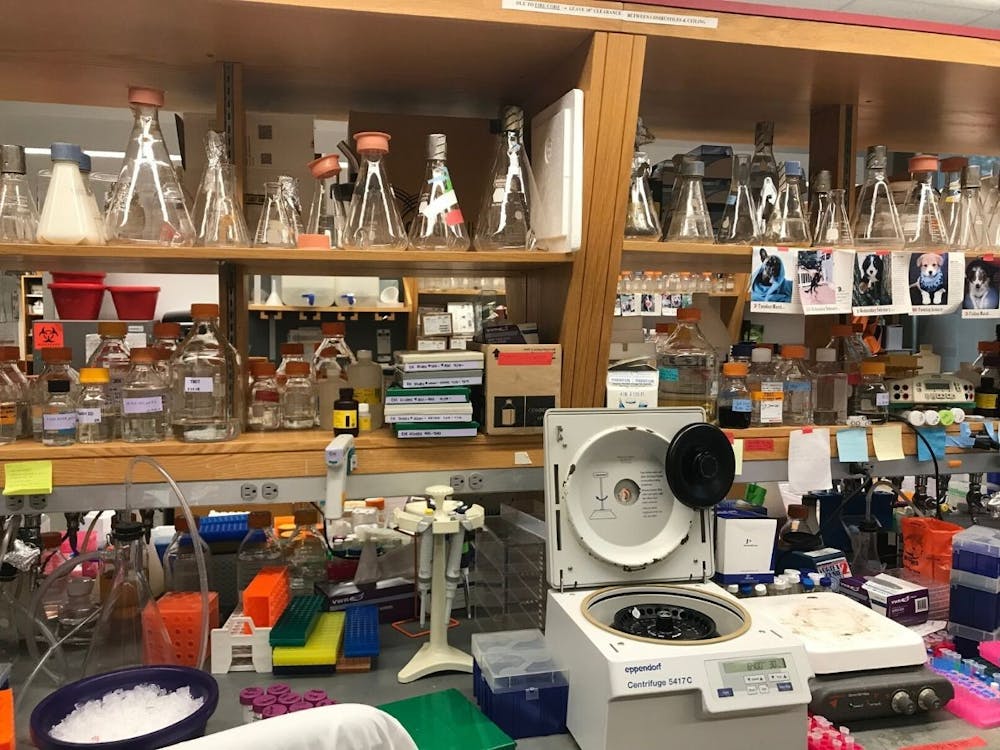Eight years of work and some well-timed coincidences led Donald McDonnell and his lab to a discovery that could change the lives of breast cancer patients.
McDonnell, chair of the department of pharmacology and cancer biology, researches a type of breast cancer called estrogen-receptor positive cancer—a type in which tumor cells grow in response to the hormone estrogen. He said ER-positive breast cancer makes up about 75% of cases of the disease.
Doctors can treat this kind of cancer with endocrine therapy, which uses anti-estrogen hormones to stop tumors from growing, according to the Mayo Clinic. However, McDonnell said that some cancers are resistant to this treatment, which leaves traditional chemotherapy as the only option.
The product of eight years of research conducted in McDonnell’s lab, recently published in Cell Reports, could change that. Researchers discovered a way to stop tumors from growing by using antibodies to target two proteins found in endocrine-therapy-resistant cancer cells.
“This would likely be another relatively benign, in terms of side effects, therapy, so that it potentially could extend the life of patients who have late-stage disease,” McDonnell said.
Instead of trying to prevent cells from becoming resistant, the researchers in McDonnell’s lab explored ways to exploit the differences between resistant and non-resistant cells, creating treatments that would be uniquely effective in cells that do not respond to traditional therapy.
Researchers identified two proteins, AGR2 and LYPD3, present in therapy-resistant cancers. The proteins interact with each other, and the researchers thought that they might be able to prevent tumor growth by targeting them with a drug.
McDonnell said that he was presenting these results at a Duke Cancer Institute research meeting when Jim Abbruzzese, D.C.I. professor of medical oncology at Duke, told him about research that identified LYPD3 in pancreatic cancer cells. Moreover, Abbruzzese said that a researcher at the MD Anderson Cancer Center had developed antibodies that neutralized the protein.
Interested, McDonnell went to Texas.
Charles Logsdon, professor and chair of cancer biology at MD Anderson, had created antibodies to both proteins and licensed them to a company called Viba Therapeutics. Viba, a company in which McDonnell owns stock, provided the antibodies to researchers in McDonnell’s lab, who injected them into mice with endocrine-resistant breast cancer.
The results were striking: The tumors stopped growing.
“I think a lot of basic science is kind of putting pieces together until you make that connection,” said Kimberly Darlington, a former M.D.-Ph.D. student and researcher in McDonnell’s lab, of the discoveries that led to the team’s breakthrough.
McDonnell’s team submitted their findings for publication, he said, but the reviewers wanted more from them. Animal models were one thing, but were the proteins found in human breast cancer as well?
Answering that question took more collaboration. McDonnell turned to Mitch Dowsett, a professor of biochemical endocrinology at the Royal Marsden Hospital in London who oversees large collections of data on tumors in humans.
McDonnell’s team worked with tissue samples that Dowsett had gathered. Their findings matched what they had seen so far: AGR2 and LYPD3 were highly prevalent in cells from tumors that were resistant to traditional therapy.
“My goal in starting this project was to understand the process and trials and tribulations of drug discovery, and I feel like we’ve sort of gone through the gamut,” Darlington said, from working with cells to performing mouse studies to finding evidence that their treatment could work in humans.
An unlikely start to a long career
Today, McDonnell runs a lab on the second floor of Duke’s Levine Science Research Center that manages to be both spacious and, in some places, cluttered. Researchers peer into microscopes, machinery covers the countertops and shelves feature an array of bottles and boxes.
This is not where McDonnell thought he would end up, he said. He grew up in Limerick, Ireland, and he earned a scholarship to study marine biology at the National University of Ireland, Galway. That plan changed when he met Mary Downes at a community dance, whose mother had been diagnosed with breast cancer earlier that day.
McDonnell and Downes started dating, and Downes’ mother would have him go to the library to research her disease. That research inspired McDonnell to go to the group that had given him the scholarship and ask to use the money to study breast cancer.
Get The Chronicle straight to your inbox
Sign up for our weekly newsletter. Cancel at any time.
“The guy who was the head of the scholarship committee said, ‘You know, my daughter or my wife may get breast cancer some day. Take your scholarship and go and study breast cancer,’” McDonnell said.
McDonnell studied metabolism and immunology at NUI Galway, graduating in 1983. By then, he and Downes had married and the couple moved to Houston so that McDonnell could pursue a Ph.D. at Baylor.
McDonnell is now 58, and he said he has had an “amazing career” in breast cancer research.
“I would have been cold, poor and wet for the rest of my life, as a marine biologist on the west coast of Ireland,” he said, laughing.
Today, McDonnell’s lab is working with Viba to develop versions of their antibodies that work in humans. McDonnell said that he is hopeful about the results, and a drug could be on the market soon.
Matthew Griffin was editor-in-chief of The Chronicle's 116th volume.

